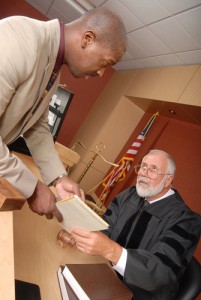 Should the need arise, and it often does, you may need to appear before a judge in court. If this happens, it can be helpful to know what to expect.
Should the need arise, and it often does, you may need to appear before a judge in court. If this happens, it can be helpful to know what to expect.
What to wear:
Dressing appropriately in court is of the utmost importance. Wearing shorts, a t-shirt, or sandals can give the wrong impression to the judge, and can start the proceeding on the wrong foot. Your clothes should be neat in appearance, meaning that they should be clean and not wrinkled. Men should be sure to wear a shirt with a collar, pants, or a suit. If you are appearing before a jury, a tie is recommended. Women should be sure to wear clothing that is neither too tight, nor too revealing. Appropriate attire includes: a suit, a dress, a skirt, or pants. Shorts, a t-shirt, or sandals are not appropriate for anyone. Do not be afraid to ask your attorney what attire would be appropriate for your case.
How to act:
Any time you appear in court, whether it be for a hearing or trial, it is a formal proceeding. The judge and other court personnel should be treated with the highest level of respect. Any cell phones or pages should be turned off before entering the courtroom. In general, you should only speak when spoken to. Outbursts of any kind will not be tolerated by the judge. In short, remain on your best behavior. Again, do not be hesitant to ask your attorney what to expect or how to behave. The law firm of Lindsay, Lindsay, and Parsons has a successful history in assisting with landlord-tenant disputes. In the past, we have represented both apartment complex owners as well as a large number of tenants. Before taking any action, whether you are a landlord or a tenant, it is highly recommended that you seek the advice of an attorney to assist you in determining the legal consequences of that action. The Texas legislature has set forth volumes of codes and procedures which must be followed by either landlords, tenants, or both. With our experience in this area of the law, we can help you navigate those requirements and comply with all aspects of Texas law. Please feel free to call us for a free consultation to help you determine your rights and responsibilities.



